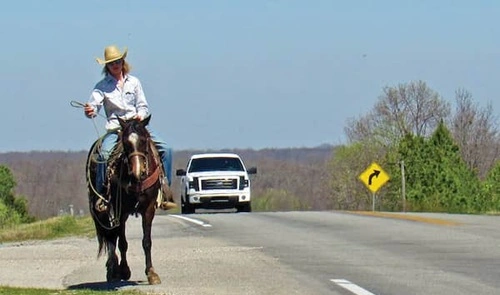Yes, in many states across the United States, riding a horse while intoxicated can be illegal. While laws vary by state, many jurisdictions classify riding a horse under the influence as a form of “driving under the influence” (DUI) or a similar offense, since horses are considered vehicles under some state traffic laws.
The Legal Basis for Prohibiting Drunk Horse Riding
Riding a horse drunk is not universally addressed in all state laws, but it often falls under existing statutes related to public safety and intoxication.
Traffic Laws and DUIs
1. Vehicle Definitions:
- In states where horses are considered vehicles under traffic laws, riding while intoxicated can result in a DUI or related charge.
- Kentucky: State law explicitly includes horses as vehicles, and drunk horseback riders can be charged with a DUI.
- California: Under Vehicle Code 21050, horseback riders must adhere to the same rules of the road as motor vehicle drivers, including DUI laws.
2. Public Safety Concerns:
- Even in states where horses are not classified as vehicles, intoxicated horseback riding may still be penalized if it endangers others or causes an accident.
Public Intoxication Laws
In states without specific DUI laws for horseback riding, individuals can still face charges for public intoxication if they ride a horse drunk on public roads or in public spaces. Public intoxication is generally a misdemeanor and can lead to fines or jail time.
Animal Cruelty Laws
Riding a horse while intoxicated can be considered animal cruelty in some cases. If the rider’s impaired state endangers the horse’s well-being, charges could be filed under state animal welfare laws.
State-Specific Examples
1. Texas: Riding a horse drunk is considered illegal under DUI laws, as horses are categorized as vehicles. In 2009, a man in Texas was convicted of DUI for riding his horse while intoxicated.
2. Colorado: While horses are not classified as vehicles, riders can be charged with public intoxication or animal cruelty.
3. Florida: A 2017 case saw a woman arrested for DUI while riding a horse on a public road with a blood alcohol content of 0.161—double the legal limit for driving.
Consequences of Riding a Horse Drunk
Criminal Penalties
- DUI Charges: In states where drunk horseback riding is treated as a DUI, penalties may include fines, jail time, and license suspension, even though a license is not required to ride a horse.
- Public Intoxication: Riders may face misdemeanor charges, with penalties varying by state but often including fines or short jail sentences.
- Animal Cruelty: In extreme cases, riders can face charges for endangering their horse, which may carry additional fines and penalties.
Civil Liability
If an intoxicated rider causes an accident or injury, they may be held civilly liable for damages. This includes harm caused to pedestrians, vehicles, or other animals.
Ethical and Safety Concerns
1. Risk to the Rider:
- Riding a horse requires coordination and judgment, both of which are impaired by alcohol. An intoxicated rider is more likely to fall or lose control of the horse.
2. Risk to the Horse:
- Horses rely on their riders for guidance. An impaired rider can inadvertently put the horse in dangerous situations, such as navigating traffic or rough terrain.
3. Public Safety:
- An uncontrolled horse can become a danger to bystanders, vehicles, and other animals, potentially causing accidents or injuries.
Recent Cases and Legal Developments
- Florida, 2023: Lawmakers considered expanding DUI definitions to explicitly include horseback riding due to increasing incidents involving intoxicated riders on public roads.
- Kentucky, 2022: A man was fined and required to complete alcohol education classes after being convicted of DUI for riding his horse drunk in a rural area.
- California, 2021: Local authorities increased enforcement of public intoxication laws after reports of drunk riders on trails shared with pedestrians.
How to Avoid Legal Issues
1. Designate a Sober Rider:
- If horseback riding is part of an event where alcohol is served, ensure that at least one rider remains sober to guide the group.
2. Stay Off Public Roads:
- Limit horseback riding to private property or designated trails to avoid traffic-related incidents or legal scrutiny.
3. Know Your State Laws:
- Familiarize yourself with local laws regarding horseback riding and intoxication to ensure compliance.
Common FAQs
Q1. Can I get a DUI for riding a horse drunk?
Ans: Yes, in many states, you can be charged with a DUI or similar offense if you ride a horse while intoxicated, particularly on public roads.
Q2. Are horses considered vehicles under the law?
Ans: In some states, horses are classified as vehicles under traffic laws, making them subject to DUI regulations.
Q3. What happens if I ride a horse drunk on private property?
Ans: Generally, riding a horse drunk on private property is not illegal. However, if the horse’s welfare is compromised, you could face animal cruelty charges.
Q4. Is public intoxication a charge for riding a horse drunk?
Ans: Yes, even if DUI laws don’t apply, you could be charged with public intoxication if you ride a horse drunk in a public area.
Q5. What are the penalties for drunk horseback riding?
Ans: Penalties vary by state but can include fines, jail time, community service, and mandatory alcohol education programs.

